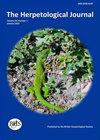How did the toad get over the sea to Skye? Tracing the colonisation of Scottish inshore islands by common toads (Bufo bufo)
IF 0.6
4区 生物学
Q3 ZOOLOGY
引用次数: 1
Abstract
Processes of island colonisation have long been of interest to biologists. Colonisation events themselves are rarely observed, but the processes involved may be inferred using genetic approaches. We investigated possible means of island colonisation by common toads (Bufo bufo) in western Scotland (the Isle of Skye and five neighbouring small islands), using evidence derived from nuclear microsatellites and mitochondrial (mt) DNA. Levels of microsatellite allelic richness for populations on Skye were high and comparable to adjacent mainland populations, but lower for populations on small islands. Pairwise measures of genetic distances between populations and a clustering algorithm were both suggestive of frequent gene flow between Skye and the mainland. For small islands the levels of genetic differentiation were higher, implying stronger isolation and no evidence for inbreeding. The distribution of mtDNA haplotypes broadly mirrored the genetic structure revealed by microsatellites. Reconciled with existing palaeoclimatological evidence, since the last glaciation, our findings rule out the possibility that the B. bufo populations stem from glacial refugia, or that recent anthropogenic transfer of toads is responsible for their current distribution. The most parsimonious explanation of our data is that the studied inshore islands have been repeatedly colonised via rafting from the mainland or neighbouring islands. This may give us insights into the processes likely to take place when ice sheets retreat poleward as a result of climate change. It also has implications for the colonisation of both native and invasive non-native species, and hence the biosecurity of island refugia.蟾蜍是怎么漂洋过海来到斯凯的?追踪常见蟾蜍对苏格兰近海岛屿的殖民(蟾蜍)
长期以来,生物学家一直对岛屿殖民过程感兴趣。殖民事件本身很少被观察到,但所涉及的过程可以通过基因方法推断出来。我们利用来自核微卫星和线粒体(mt)DNA的证据,研究了苏格兰西部(斯凯岛和邻近的五个小岛)常见蟾蜍(蟾蜍)在岛屿上定居的可能方式。斯凯岛种群的微卫星等位基因丰富度水平较高,与邻近大陆种群相当,但小岛屿种群的等位基因丰度较低。种群之间遗传距离的成对测量和聚类算法都表明斯凯和大陆之间的基因流动频繁。对于小岛屿,遗传分化水平更高,这意味着更强的隔离性,没有近亲繁殖的证据。mtDNA单倍型的分布广泛反映了微卫星揭示的遗传结构。与现有的古气候证据相一致,自上次冰川作用以来,我们的发现排除了蟾蜍种群来源于冰川避难所的可能性,或者蟾蜍最近的人为迁移是其目前分布的原因。对我们的数据最简单的解释是,所研究的近海岛屿多次通过从大陆或邻近岛屿漂流而被殖民化。这可能会让我们深入了解气候变化导致冰盖向极地退缩时可能发生的过程。它还对本土和入侵性非本土物种的殖民地化产生了影响,从而影响了岛屿避难所的生物安全。
本文章由计算机程序翻译,如有差异,请以英文原文为准。
求助全文
约1分钟内获得全文
求助全文
来源期刊

Herpetological Journal
生物-动物学
CiteScore
2.40
自引率
10.00%
发文量
25
审稿时长
>12 weeks
期刊介绍:
The Herpetological Journal is the Society''s prestigious quarterly scientific journal.
 求助内容:
求助内容: 应助结果提醒方式:
应助结果提醒方式:


